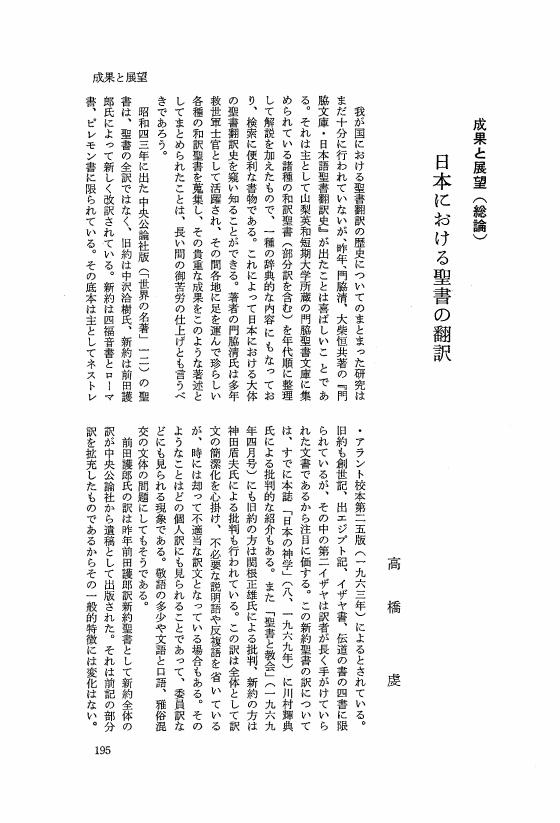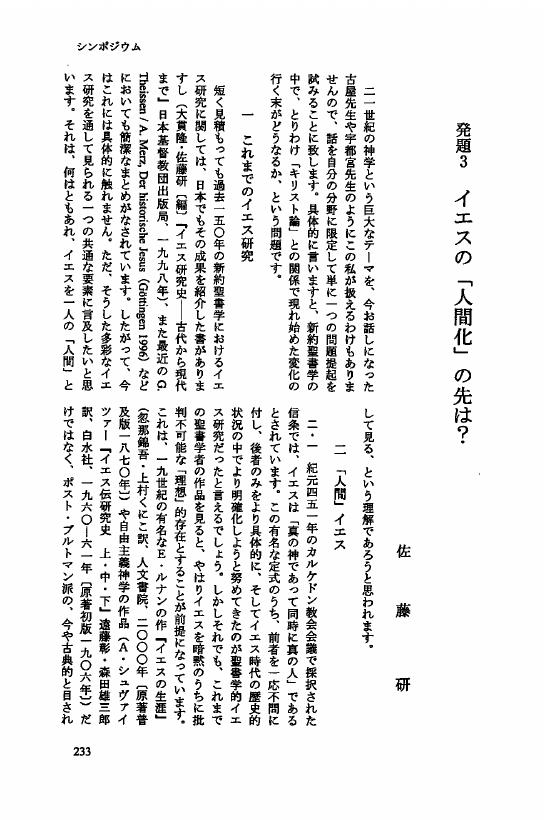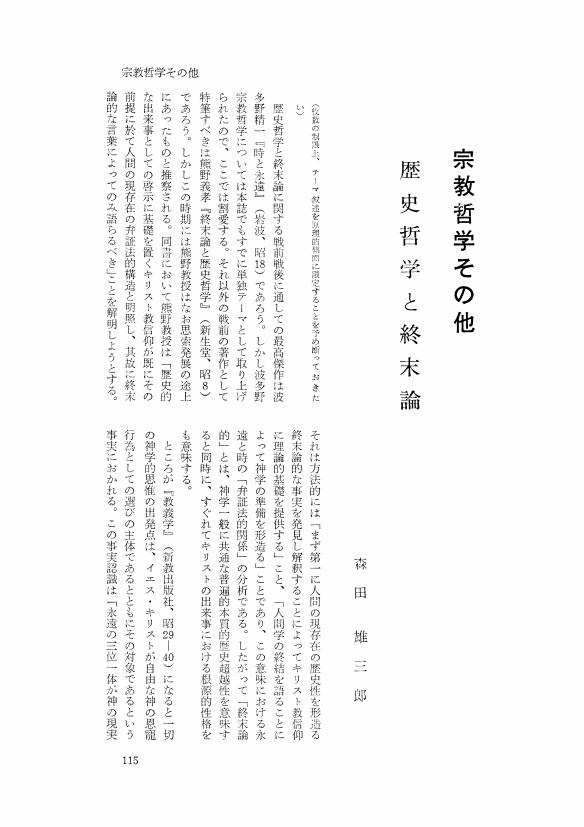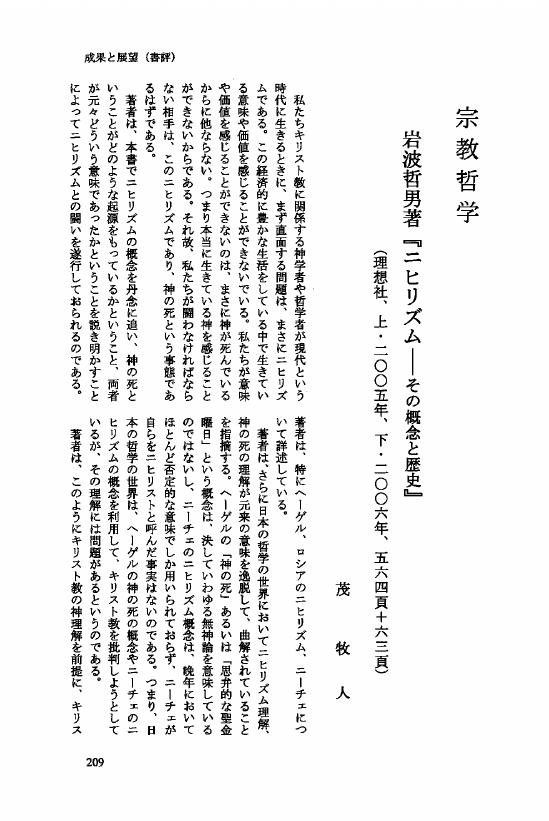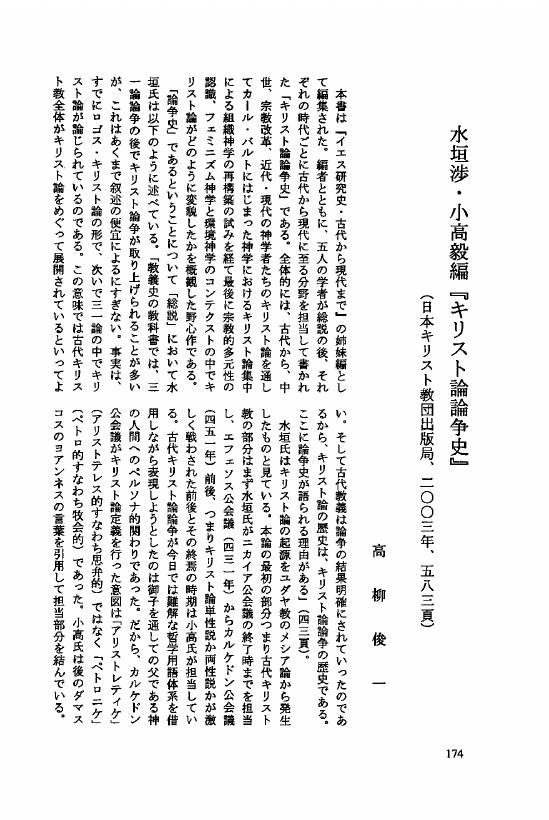1 0 0 0 OA 発題2 聖書学の立場から
- 著者
- 山我 哲雄
- 出版者
- 日本基督教学会
- 雑誌
- 日本の神学 (ISSN:02854848)
- 巻号頁・発行日
- vol.2007, no.46, pp.249-253, 2007-09-20 (Released:2009-10-23)
1 0 0 0 OA 初期シュライエルマッハーにおける「人間性」概念について
- 著者
- 川島 堅二
- 出版者
- The Japan Society of Christian Studies
- 雑誌
- 日本の神学 (ISSN:02854848)
- 巻号頁・発行日
- vol.1993, no.32, pp.45-67, 1993-10-05 (Released:2009-10-23)
- 参考文献数
- 80
- 著者
- 佐藤 敏夫
- 出版者
- 日本基督教学会
- 雑誌
- 日本の神学 (ISSN:02854848)
- 巻号頁・発行日
- vol.1993, no.32, pp.162-167, 1993-10-05 (Released:2009-10-23)
1 0 0 0 OA 日本における聖書の翻訳
- 著者
- 高橋 虔
- 出版者
- The Japan Society of Christian Studies
- 雑誌
- 日本の神学 (ISSN:02854848)
- 巻号頁・発行日
- vol.1984, no.23, pp.195-204, 1984-12-25 (Released:2009-10-23)
- 被引用文献数
- 2
1 0 0 0 OA 発題3 イエスの「人間化」の先は?
- 著者
- 佐藤 研
- 出版者
- 日本基督教学会
- 雑誌
- 日本の神学 (ISSN:02854848)
- 巻号頁・発行日
- vol.2002, no.41, pp.233-238, 2002-09-20 (Released:2009-10-23)
1 0 0 0 OA 女性としての聖霊
- 著者
- 竹田 文彦
- 出版者
- The Japan Society of Christian Studies
- 雑誌
- 日本の神学 (ISSN:02854848)
- 巻号頁・発行日
- vol.47, pp.59-86, 2008-09-16 (Released:2011-08-03)
- 参考文献数
- 89
The Syriac word for ‘spirit’, ruha, which is grammatically feminine like Hebrew ruah, had a great influence on the understanding of the Holy Spirit in the early Syriac Christianity. From the early fifth century onwards, under the increasing prestige of Greek culture, some people began to disapprove of treating the Holy Spirit as feminine, and the word ruha began to be treated as masculine wherever it referred to the Holy Spirit, even by ignoring the grammatical rules of the language. However, many feminine images and metaphors survived and had continuously been used to express the character of the Holy Spirit. Especially, the tradition to understand the Holy Spirit as mother was very strong. By using many maternal images, such as hovering (like a mother bird) and womb, Syriac Christians got a better understanding of the Holy Spirit. It is important for us to be aware of, and to have a sensitivity to, this female imagery already present in the Syriac Christian tradition, for only by gaining this sensitivity, we can attain to a better appreciation of the fullness of the Holy Spirit, not only in its fatherly character but also in its motherly character.
- 著者
- 芦名 定道
- 出版者
- 日本基督教学会
- 雑誌
- 日本の神学 (ISSN:02854848)
- 巻号頁・発行日
- no.48, pp.en26-en29, 2009
1 0 0 0 OA 荒井 献著『「真理の福音」のキリスト論-宗教史的研究』
- 著者
- 蛭沼 寿雄
- 出版者
- The Japan Society of Christian Studies
- 雑誌
- 日本の神学 (ISSN:02854848)
- 巻号頁・発行日
- vol.1965, no.4, pp.47-52, 1965-09-15 (Released:2009-09-16)
- 被引用文献数
- 2
1 0 0 0 OA 半田元夫・今野国雄著『キリスト教史I、宗教改革以前』(山川出版社、一九七七年、五〇四頁+二八頁) 藤代泰三著『キリスト教史』(日本YMCA同盟出版部、一九七九年、六三二頁+四六頁) 歴史神学
- 著者
- 宮谷 宣史
- 出版者
- 日本基督教学会
- 雑誌
- 日本の神学 (ISSN:02854848)
- 巻号頁・発行日
- vol.1980, no.19, pp.107-112, 1980-12-25 (Released:2009-09-16)
- 被引用文献数
- 1
1 0 0 0 OA 吉村善夫著『現代の神学と日本の宣教』
- 著者
- 佐藤 敏夫
- 出版者
- 日本基督教学会
- 雑誌
- 日本の神学 (ISSN:02854848)
- 巻号頁・発行日
- vol.1965, no.4, pp.74-80, 1965-09-15 (Released:2009-09-16)
- 被引用文献数
- 1
1 0 0 0 パウロの贖罪論のもう一つの次元
- 著者
- 太田 修司
- 出版者
- 日本基督教学会
- 雑誌
- 日本の神学 (ISSN:02854848)
- 巻号頁・発行日
- vol.1995, no.34, pp.45-63, 1995
1 0 0 0 OA 初期ユダヤ教とルカ文書における「知恵」の一側面
- 著者
- 大澤 香
- 出版者
- 日本基督教学会
- 雑誌
- 日本の神学 (ISSN:02854848)
- 巻号頁・発行日
- vol.56, pp.9-31, 2017-09-25 (Released:2019-06-05)
- 参考文献数
- 28
The “God-Fearers” in Luke have been thought of as gentile sympathizers. In the context of ancient Israel, “Fear of YHWH” was strongly connected with Israelite observance of the Law of YHWH. How did such an important concept in the piety of Israel and Jewish identity come to describe gentile believers? Investigation of the interpretation of this phrase in the Second Temple period gives us an important clue. In the Second Temple period there seems to have been a consensus that love of God was superior to fear of God. From the examples in the Second Temple period, there must have been a common understanding of “God-Fearers” as referring to gentile believers before Luke. But it appears that in Acts, Luke deliberately put “God-Fearer” and “God-Worshiper” in the story as a literary strategy, using the sense of “God-Fearers” as connoting religious piety continuing from ancient Israel, to mitigate the peripherality of gentile believers.
1 0 0 0 OA 歴史哲学と終末論
- 著者
- 森田 雄三郎
- 出版者
- 日本基督教学会
- 雑誌
- 日本の神学 (ISSN:02854848)
- 巻号頁・発行日
- vol.1967, no.6, pp.115-120, 1967 (Released:2009-09-16)
- 著者
- 高尾 利数
- 出版者
- The Japan Society of Christian Studies
- 雑誌
- 日本の神学 (ISSN:02854848)
- 巻号頁・発行日
- vol.1968, no.7, pp.159-166, 1968-09-30 (Released:2009-10-23)
1 0 0 0 OA 瀧沢克己著『仏教とキリスト教』を読む
- 著者
- 片山 正直
- 出版者
- 日本基督教学会
- 雑誌
- 日本の神学 (ISSN:02854848)
- 巻号頁・発行日
- vol.1965, no.4, pp.80-86, 1965-09-15 (Released:2009-09-16)
- 著者
- 鈴木 浩
- 出版者
- The Japan Society of Christian Studies
- 雑誌
- 日本の神学 (ISSN:02854848)
- 巻号頁・発行日
- vol.1999, no.38, pp.95-101, 1999-10-05 (Released:2009-10-23)
- 被引用文献数
- 1 1
- 著者
- 茂 牧人
- 出版者
- The Japan Society of Christian Studies
- 雑誌
- 日本の神学 (ISSN:02854848)
- 巻号頁・発行日
- vol.2007, no.46, pp.209-214, 2007-09-20 (Released:2009-10-23)
- 著者
- 高柳 俊一
- 出版者
- The Japan Society of Christian Studies
- 雑誌
- 日本の神学 (ISSN:02854848)
- 巻号頁・発行日
- vol.2004, no.43, pp.174-179, 2004-10-07 (Released:2009-10-23)
- 著者
- 安井 聖
- 出版者
- The Japan Society of Christian Studies
- 雑誌
- 日本の神学 (ISSN:02854848)
- 巻号頁・発行日
- vol.2007, no.46, pp.163-168, 2007-09-20 (Released:2009-10-23)
- 著者
- 高柳 俊一
- 出版者
- The Japan Society of Christian Studies
- 雑誌
- 日本の神学 (ISSN:02854848)
- 巻号頁・発行日
- vol.2000, no.39, pp.104-111, 2000-10-10 (Released:2009-10-23)



